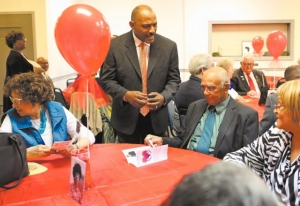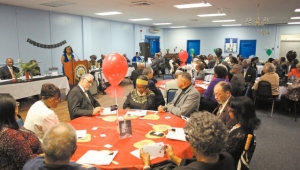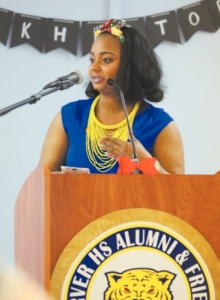Carver alumni host Black History Month program
By Steve Herring
Published in News on February 20, 2018 5:50 AM

News-Argus/CASEY MOZINGO
Event speaker the Rev. Dr. Gregory E. Perkins visits with a few tables before the beginning of the Carver High School Alumni and Friends black history program Friday night.

News-Argus/CASEY MOZINGO
People gather in the Carver Cultural Center Friday night for the annual Carver High School Alumni and Friends Association black history program.

News-Argus/CASEY MOZINGO
Mistress of Ceremonies Debony Jones speaks about how she feels about being selected to lead the event.
"Let ... individuals make the most of what God has given them, have their neighbors do the same, and then do all they can to serve each other. There is no use in one man, or one nation, to try to do or be everything. It is a good thing to be dependent on each other for something, it makes us civil and peaceable."
-- Sojourner Truth (1797-1883), African-American abolitionist and women's rights activist.
The Rev. Dr. Gregory Perkins of Fayetteville drew the inspiration for his comments from that quote as the keynote speaker for the Carver High School Alumni Association and Friends Black History Month program.
More than 100 people attended the Friday night program held at the Carver Cultural Center, the former Carver High School.
A native of Houston, Texas, Perkins is contributing faculty member with Walden University and a former assistant chair for the school of social work and faculty scholar to the Center for Defense and Homeland Security with a focus area of higher education and emergency management at Fayetteville State University.
He spent more than 22 years in the military and is an Army combat veteran. Perkins is a former pastor at Mount Olive's Shady Grove Church.
Debony T. Jones of Dudley, vice president of the Young Democrats of Wayne County, was the mistress of ceremonies.
Dr. Martin Luther King Jr. started small, but rallied others who believed their efforts mattered and who pressed on through challenges and doubts to change the world for the better, Perkins said.
King is a permanent inspiration for the rest of the world to keep pushing toward justice, he said.
Referring back to Truth's quote, he told audience members that people need to serve one another. It is a message also found in the Bible, and that by serving others, especially the least, people serve Jesus, he said.
"So if this great gathering is going to continue, and if you take anything else from this gathering today, it is that we must all work together, and we must serve each other," Perkins said.
Under the current "great administration" only the wealthiest top one percent has grown, while under the Obama and Clinton administrations the average wealth for people like him and those in the audience went up, he said.
"So more of our people, people who look like you and I, hard-working folks ... were able to stratify up instead of falling down," he said. "But now it is harder to make it to the top.
"So we have to make our own top, but we can't do it alone. We must serve each other."
Perkins' second point from the quote was that one person cannot do it all.
A sure way to kill the association would be to allow one person to "steal the show," he said.
If it is to continue, those who "like to shine" need to sit down, he said.
Also, as Truth wrote, people may think they are independent, but are actually dependent on each other.
Some people will have a challenge in being dependent on others, but that is the way people need to be, he said.
In her closing comments, Cassandra Rush, association national board president, elaborated on Perkins' comments.
"History gives us a fuller understanding of ourselves so that we can face the future," she said. "Humanity implores that we be dependent on one another as Booker T. Washington stated, 'There are two ways of exercising one's strengths. One is pushing down. One is pulling up. Putting others first leads to love and unity.'"
The roots of the civil rights movement were founded on the belief that civil rights are class rights to protect others, she said.
More importantly these rights ensure one's ability to participate in life without discrimination, Rush said.
Some believe that the civil rights movement should be enshrined as opposed to endorsing the formation of the protest movements of today, she said.
Although they may be new in formation, the principles are basically the same -- to continue to explore injustices surrounding economics, criminal activism and peace activism, she said.
"Perseverance serves as the ultimate answer toward change," she said.
One truth is that not everyone has the temperament to police, she said.
Rush's late husband was a police officer and at one time worked in internal affairs policing the police.
"After his passing I received accolades about how he treated people, his fairness and his leadership abilities he demonstrated," she said. "What must resonate among us as Americans is irrespective of party lines within government, law enforcement, mental health arena, communities and families that yet another horrific school shooting occurred just two days ago. There is no real solution to stemming these tragedies, but it must be a collective effort between these sectors.
"We as families and friends can have realistic conversations with our children about potential dangers in society -- the contribution of social media, how to maneuver interactions with police, the devastating effects of bullying, life preparation after high school and the basics of economics that you can't spend what you don't have and that nobody, but nobody will care for you like family."
Children cannot model what they do not see or hear, Rush said.
"To the children that are told by classmates that they are different, tell them thank you," she said.
"'I am so glad you recognized it.'"
She encouraged youths also to respond that they are unique and on a path of their own.
She asked what people are doing as a community to help others.
"Dr. Martin Luther King phrased it best, 'Life's most persistent and urgent question is what are you doing for others?'" she said.
